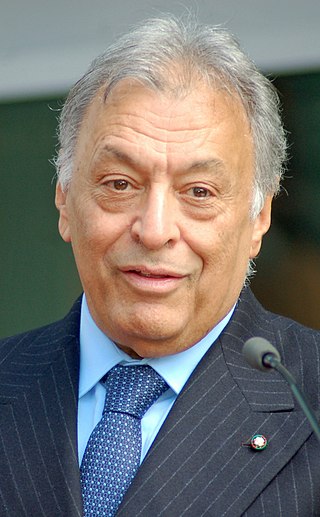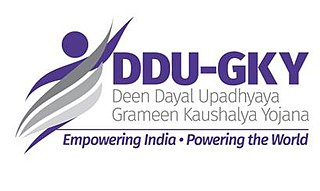
Ravi Shankar was an Indian sitarist and composer. A sitar virtuoso, he became the world's best-known expert of North Indian classical music in the second half of the 20th century, and influenced many musicians in India and throughout the world. Shankar was awarded India's highest civilian honour, the Bharat Ratna, in 1999. He is also the father of American singer Norah Jones.

Zubin Mehta is an Indian conductor of Western classical music. He is music director emeritus of the Israel Philharmonic Orchestra (IPO) and conductor emeritus of the Los Angeles Philharmonic.
Mehli Mehta was an Indian conductor and violinist.

Jonathan May was an American cellist and conductor. He resided in the Orlando, Florida area and was noted for founding and directing numerous youth orchestras and music programs throughout the region.

The Portland Youth Philharmonic (PYP) is the oldest youth orchestra in the United States, established in 1924 as the Portland Junior Symphony (PJS). Now based in Portland, Oregon, the orchestra's origin dates back to 1910, when music teacher Mary V. Dodge began playing music for local children in Burns, Oregon. Dodge purchased instruments for the children and organized the orchestra, which would become known as the Sagebrush Symphony Orchestra. After touring the state, including a performance at the Oregon State Fair in Salem, the orchestra disbanded in 1918 when Dodge moved to Portland. There, Dodge opened a violin school and became music director of the Irvington School Orchestra.
Music for Youth (MFY) is a British charity which provides free access to educational and performance opportunities for groups of young musicians and audiences through a series of festivals and concerts throughout the UK. Two million children have taken part in Music for Youth events since 1971. Sixty thousand 4- to 21-year-olds took part in 76 Music for Youth festivals and concerts in 2006, with 85% of these coming from state schools. Each year MFY aims to work with 100,000 young musicians.
The National Children's Orchestras of Great Britain, more commonly known as NCO, is a registered charity which provides orchestral training for children aged 8 to 14. The organisation comprises three age-banded orchestras and four project orchestras. Entry is by audition and every year approximately 500 young musicians are selected to play in the orchestras. It offers a life-changing experience to talented young musicians.

The Singapore National Youth Orchestra (SNYO) is the national youth orchestra of Singapore. It is recognised by the Ministry of Education as a National Project of Excellence and a key development programme for talented young musicians. Since 1 January 2016, the Singapore Symphony Orchestra (SSO) has assumed management and operational responsibility for the SNYO, taking over the reins from the Ministry of Education.

El Sistema is a publicly financed, voluntary sector, music-education program, founded in Venezuela in 1975 by Venezuelan educator, musician, and activist José Antonio Abreu. It later adopted the motto "Music for Social Change." El Sistema-inspired programs provide what the International Journal of Applied Psychoanalytic Studies describes as "free classical music education that promotes human opportunity and development for impoverished children." El Sistema has inspired similar programmes in more than 60 other countries. By 2015, according to official figures, El Sistema included more than 400 music centers and 700,000 young musicians. The original program in Venezuela involves four after-school hours of musical training and rehearsal each week, plus additional work on the weekends.

For India, the concept of non-alignment began as a policy of non-participation in the military affairs of a bipolar world and in the context of colonialism aimed towards optimum involvement through multi-polar participation towards peace and security. It meant a country should be able to preserve a certain amount of freedom of action internationally. There was no set definition of non-alignment, which meant the term was interpreted differently by different politicians and governments, and varied in different contexts. The overall aims and principles found consensus among the movement members. Non-aligned countries, however, rarely attained the freedom of judgement they desired and their actual behaviour towards the movement's objectives, such as social justice and human rights, were unfulfilled in many cases. India's actions often resembled those of aligned countries. The response of the non-aligned nations during India's wars in 1962, 1965 and 1971 revealed non-aligned positions on issues such as secession. The non-aligned nations were unable to fulfil the role of peacekeepers during the Indo-China war of 1962 and the Indo-Pakistan war of 1965 despite meaningful attempts. The non-aligned response to the Bangladesh Liberation War and the following 1971 Indo-Pakistan War showed most of the non-aligned nations prioritised territorial integrity above human rights, which could be explained by the recently attained statehood for the non-aligned. During this period, India's non-aligned stance was questioned and criticized. Jawaharlal Nehru had not wanted the formalization of non-alignment and none of the non-aligned nations had commitments to help each other. The international rise of countries such as China also decreased incentives for the non-aligned countries to stand in solidarity with India.
The National Youth Orchestra of Wales is the national youth orchestra of Wales, based in Cardiff. Founded in 1945, it is the longest-standing national youth orchestra in the world.

The South African National Youth Orchestra Foundation is a non-profit organisation in the music education and development sector. The Foundation supports the training and development of South Africa's young musicians through national courses, national and international tours and workshops, and networks nationally and internationally. It also assists regional youth orchestra and music education programmes countrywide. It organises youth orchestra courses, where the South African National Youth Orchestras are formed. This has included the South African National Youth Orchestra, South African National Concert Orchestra, the South African National Wind Orchestra, the South African National Youth Baroque Orchestra, South African National Youth Brass and the South African National Youth String Orchestra. Members of these orchestras are under the age of 25.
The Johannesburg Youth Orchestra (JYO) is a youth symphony orchestra founded in 1976. It is a full size symphony orchestra based in Johannesburg, South Africa, and is made up entirely of children and youth who have achieved a musical level of Grade 6 or higher. The youngest member is 12 years old and the oldest members in their mid-twenties.

Jacques Gershkovitch (1884–1953) was a Russian conductor and musician who became the first music director of the Portland Junior Symphony, the first youth orchestra in the United States, based in Portland, Oregon. Born to a musical family in Irkutsk, Gershkovitch was sent to Saint Petersburg in his late teens to study at the Imperial Conservatory. In 1913, he graduated with honors in flute and conducting, and was awarded the Schubert Scholarship for a year of study under German conductor Arthur Nikisch in Berlin. Gershkovitch returned to Irkutsk to enlist during World War I, and by 1916 he had become head of the Imperial Russian Army's military symphony orchestra. He held this position through the Russian Revolution and thereafter, as concerts were often presented as benefits for orphans and the Red Cross.
Huw Edwards is a Welsh conductor. Edwards' conducting career began at age seventeen when he became music director of the Maidstone Opera Company in England. He later attended the University of Surrey, where he conducted the college orchestra along with an ensemble that he formed himself. At age twenty-three, he won a conducting competition which sent him to Southern Methodist University in Dallas, Texas. He then held a lecturer position at Northwestern University in Chicago, where he was also a doctoral candidate. Edwards was conductor and music director of the Portland Youth Philharmonic from 1995 to 2002 followed by the Seattle Youth Symphony from 2002 to 2005. He served as music director of the Portland Columbia Symphony from 2000 to 2012 and with the Olympia Symphony Orchestra from 2003 to 2020.

Dinesh Subasinghe is a Sri Lankan composer, violinist, and music producer. He composed Karuna Nadee, a Buddhist oratorio, and re-introduced a lost, ancient musical instrument known as the ravanahatha to Sri Lanka. He is also a film and television composer whose works integrate western and eastern classical music with electronic music, Buddhist music, folk music, traditional orchestral arrangements, and world music genres. From 2002 to 2009 he led the pop classical band, Dee R Cee Members.

Ambi Subramaniam is a violinist, composer, and educator. He started performing on stage when he was six years old and was described as the "new king of Indian classical violin" by the Times of India.

Grameen Kaushalya Yojana or DDU-GKY is a Government of India youth employment scheme.
Pandit Hom Nath Upadhyaya was a Nepali tabla player who specialized in Hindustani classical music. Upadhyaya served as royal court musician in Nepal.










